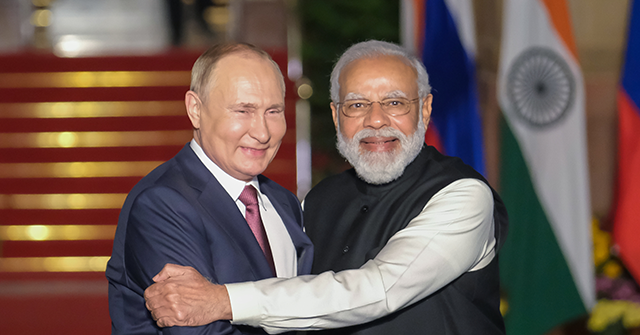Russia and India Move Away from Dollar and Euro for Bilateral Trade
Russian Foreign Ministry official Zamir Kabulov said on Wednesday that Russia and India are taking steps to use their respective national currencies for trading with each other, instead of using U.S.

dollars or euros. India began allowing rupees to be used for international trade last month, specifically with Russia and Sri Lanka. Bangladesh, Sudan, Tajikistan, Cuba, and Luxembourg may be added to the program soon.
The Reserve Bank of India (RBI) has granted Russian banks permission to open accounts in India for rupee trading, while Sri Lanka will be allowed to use the Indian rupee as a national currency. Indian export companies reportedly began allowing Russian customers to pay with rupees last week. According to Kabulov, a wholesale transition to using rupees and rubles instead of dollars can begin once India’s trade imbalance with Russia is adjusted. A pensioner counts Russian rubles after receiving a pension in rubles in Donetsk, eastern Ukraine, Wednesday, April 1, 2015. (Mstyslav Chernov/AP) “India still buys from us more than five times than it sells. Specialists are working on this, looking for a reasonable compromise,” he said. Crisis-wracked and impoverished Sri Lanka desperately needs Indian currency to inject liquidity into its financial system, while Russia is looking for ways to improve international trade after Europe and the United States imposed heavy sanctions for invading Ukraine. Some Indian financial institutions have been reluctant to let Russia process rupee transactions for fear they will trigger Western sanctions. An Indian holds 2000 rupee currency notes in Jammu, India. (Channi Anand, File/AP) For its part, India hopes to gain more global market share and reduce its trade deficit by “internationalizing” its currency. Cuba, for example, is seen by trade analysts as likely to do heavier business with India if it can use rupees.
The Indian government often argues that it has no designs on replacing the U.S. dollar as an instrument for international trade. Instead, it seeks to use rupees for transactions that would be made difficult by sanctions, such as buying oil from Russia.
Read the full article at the original website
References:
- https://interviewtimes.net/india-rupee-to-be-used-for-international-trade-in-russia-and-srilanka/
- https://www.livemint.com/economy/first-russia-shipment-under-rupee-settlement-next-week-11670776315064.html
- https://www.rt.com/business/568652-russia-india-ditch-dollar-euro/
- https://www.firstpost.com/world/sri-lanka-russia-to-use-indian-rupee-for-international-trade-more-countries-in-talks-11833771.html
- https://www.reuters.com/markets/large-indian-lenders-shun-rupee-mechanism-russia-trade-sources-2022-10-10/
- https://www.breitbart.com/terms-of-use/
- https://www.breitbart.com/privacy-policy/
- https://www.business-standard.com/article/finance/rupee-internationalisation-india-pushes-for-rupee-trade-with-cuba-122091900872_1.html
- https://timesofindia.indiatimes.com/business/india-business/why-rupee-is-still-not-an-international-currency/articleshow/92933773.cms
